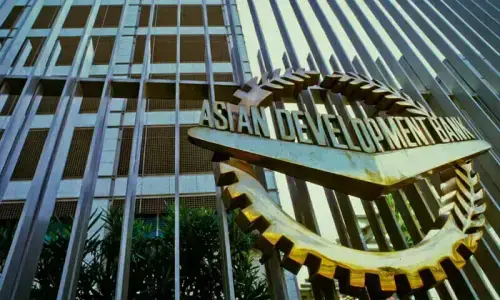EVEN if the government signs a peace accord with the banned TTP, it will provide only temporary or partial respite to the security institutions. For the latter, which have been fighting the terrorist group for the last one-and-a-half decade, making peace with the TTP may be linked to securing the border and accelerating the mainstreaming of former Fata, but any deal with the group will have implications for the whole country.
Talking with the TTP is not a popular idea among most experts, politicians, civil society activists, law-enforcement practitioners, and military commanders who fought against the group. Many assert that the state must not negotiate anything less than the surrender of the terrorists; the security institutions believe that the group is already defeated. The assumption that peace with the TTP will bring stability to the tribal region and help manage the borders with Afghanistan is also contested. For one, many disgruntled members and factions within the TTP could splinter to either form one or more new groups or join the Islamic State’s Khorasan chapter (IS-K), which has already intensified its terrorist attacks inside Pakistan.
Editorial: More transparency is needed on part of the state regarding peace talks with the TTP
The institutions may have other geopolitical objectives, which have been narrated several times on these pages, including curtailing the TTP’s ties with the intelligence agencies of hostile countries. Still, many observers believe that any agreement with the TTP will ultimately strengthen the Haqqanis in the turf war within Afghan Taliban ranks. If this is the case, it is not clear how the Haqqanis can protect the interests of Pakistan. The TTP has always had a very cordial relationship with the Haqqanis and the latter will never opt to act against it. A recent statement by the Afghan interior minister Sirajuddin Haqqani validates that argument; he not only acknowledged the ‘sacrifices’ made by the TTP for the Afghan Taliban but also insisted that they would not pressurise the TTP in the ongoing talks between the group and the Pakistani government. He categorically said that any solution should be based on mutual understanding and the principle of give and take.
The issue of talks with the TTP must be brought into the mainstream discussion.
In that context, the pursuit of making peace with the TTP looks like an illusionary idea. Significantly, the reversal of the Fata merger is critical, and TTP is not ready to compromise on this particular demand; in a recent statement, it has categorically said that the group would not accept any compromise on the pre-merger, ‘independent’ status of ex-Fata. The statement said that “if the Pakistan government and its security agencies want peace, they would have to restore its previous status”.
Also read: PPP decides to take issue of talks with TTP to parliament
The TTP’s other demands, including the enforcement of the Sharia in Malakand and its extension to the tribal districts, is apparently acceptable for the Pakistani state. Though the Nizam-i-Adl Regulation, 2009, is still operational in Malakand division, the negotiators’ apparent proclivity for accepting the demand reflects that the existence of parallel administrative structures does not bother them much. The state institutions engaged in talks are seemingly also not concerned about the legal, political and social consequences of accepting the TTP’s demands, which could later trigger more complex conflicts. This is the same mindset that did not deem it important to bring the issue to parliament; even the government has little clue about the peace process with the terrorists. Interestingly, the security institutions had demanded parliament’s support before launching the operations against the terrorists in Swat, Khyber and Waziristan, and parliament had extended its full support to the country’s armed forces.
However, the security institutions have engaged the tribal jirgas to give legitimacy to the peace process with the terrorists. One tribal jirga, or committee as the TTP called it in its media statement, comprised 32 Mehsud tribesmen, and the other jirga comprised 16 tribesmen representing different tribes from Malakand. Both jirgas met the TTP on May 13 and 14 in Afghanistan. Later, the media reported that a 57-member jirga comprising sitting and former parliamentarians and elders from the erstwhile tribal region had left for Kabul on June 1 for talks with the banned TTP. The KP government is represented in the jirga by Special Assistant to the Chief Minister on Information Barrister Mohammad Ali Saif. However, the talks are still stuck on the core demands of reversal of the Fata merger, renaming the TTP, and withdrawing Pakistani forces from the tribal districts. What the state of Pakistan has achieved so far is the TTP’s pledge to continue the ceasefire and talks without any cut-off date.
The ceasefire has resulted in a decline in terrorist attacks. The TTP has not claimed responsibility for any terrorist attack over the last few weeks, but the Gul Bahadar group has intensified terrorist attacks against the security forces during the ceasefire. The group is believed to have been involved in at least six terrorist attacks since the announcement of the ceasefire, which clearly indicates the displeasure of the Gul Bahadar group with the peace talks. The group thinks that the state must negotiate with them, as they have more presence on the ground in Waziristan and believe they can counter the TTP if allowed.
This is a delicate situation. If rising sub-nationalist tendencies in the tribal districts are brought into the picture, the case becomes more complex; it cannot be handled by jirgas alone, without any mandate or broader legitimacy or security institutions. The issue must be brought into the mainstream discussion in the media, parliament and other policy forums. An annual report of the UNSC-led 1988 Taliban sanctions committee monitoring team said the banned TTP had up to 4,000 fighters based in east and southeast areas along the Afghanistan-Pakistan border and made up the largest group of foreign fighters based there. The number of TTP members will increase manifold if it wins a deal with Pakistan.
Pakistan’s biggest counterterrorism achievement during the last two decades has been the elimination of terrorist networks from its soil and disconnecting them from their support bases. The support was present in mainstream media, thousands of madressahs across the country, religious groups, and policymaking circles. Peace with the TTP will erode the successes against a group responsible for thousands of deaths, enormous financial losses, a negative international image, and diplomatic crises.
The writer is a security analyst.
Published in Dawn, June 12th, 2022































